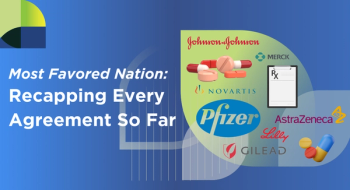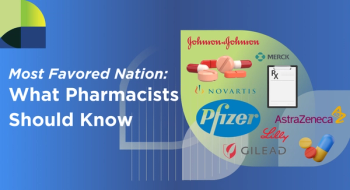
- February 2019 Heart Health
- Volume 85
- Issue 2
Is CREATES a Solution to Rising Drug Costs?
The Creating and Restoring Equal Access to Equivalent Samples Act of 2017 aims to expedite the entry of lower-cost biosimilars and generics into the market.
It is no secret that high prescription drug costs continue to be a topic of discussion among legislators, patients, and providers. The Creating and Restoring Equal Access to Equivalent Samples (CREATES) Act of 2017 aims to provide a solution to lessen some of those costs. Introduced by Sen. Patrick Leahy (D-VT), the goal of the CREATES Act is to expedite entry of lower-cost generic and biosimilar products into the market, promoting competition and allowing lower overall
For biosimilar and generic products to reach the market, generic-product developers must acquire sufficient quantities of the original competitor product (“covered product”), so they can test the drugs side-by-side to prove to the FDA that they are bioequivalent. In addition, some covered products are associated with a risk evaluation and mitigation strategy (REMS). In these cases, the developers must be able to join with the manufacturer of the covered product (“license holder”) into a shared system to assure safe use of the drug, unless the secretary of the US Department of Health and Human Services (HHS) waives the requirement and allows a separate, comparable system.2
However, according to the findings that led to the bill, certain license holders are preventing generic-product developers from either obtaining enough of the covered product to perform the necessary tests or preventing the development of a shared system for REMS. This makes the drug development process more difficult and time-consuming. Hence, covered products maintain a monopoly in the marketplace for a longer period. Without comparable generic products, covered product costs can remain unchecked, because patients do not have a less expensive alternative.
A noteworthy example of the necessity of this bill is the controversy that surrounded Turing Pharmaceuticals in 2015 when the company increased the price of Daraprim (pyrimethamine) by 5000% overnight.3 A former Turing Pharmaceuticals employee testified that the company’s plan for raising the price depended on restricting distribution to prevent generic-product developers from acquiring the necessary samples.
THE PROPOSED SOLUTION
The CREATES Act seeks to provide a tailored pathway to ensure that generic-product developers do not have to face roadblocks and patient safety is protected along the way. First, the bill specifies civil action that the generic-product developers can take against a license holder for failure to provide sufficient quantities of the covered product. It details when civil action can and should be brought, describes when the license holder is not to be held liable, and outlines potential remedies.
Additionally, the bill amends the Federal Food, Drug, and Cosmetic Act to allow generic-product developers to use either a single shared system for REMS or a different comparable system (ie, the latter would no longer require a special waiver). The exception to this would be if HHS Secretary Alex Azar were to determine that a different system could not assure safe use. In that instance, a single shared system would be required. Although the change in wording does not appear significant, it does alter the role of the secretary and make the REMS process easier for the generic product developers.
WHERE IT IS HEADED
The bill was initially referred to the Committee on the Judiciary. On June 14, 2018, the committee, which had approved the bill, swapped out the original legislation for new text.
With 28 cosponsors from various states and across both political parties, the CREATES Act has signif- icant support in the Senate. It is also supported by many pharmacists, physicians, and groups, such as AARP, the American College of Physicians, and the National Association of Chain Drug Stores. Whether this support translates into the bill becoming law remains to be seen.
Rachel B. Hardin is a PharmD candidate at the University of Kentucky College of Pharmacy in Lexington.Joseph L. Fink III, BSPharm, JD, DSc (Hon), FAPhA, is a professor of pharmacy law and policy and the Kentucky Pharmacists Association Endowed Professor of Leadership at the University of Kentucky College of Pharmacy.
References
- Congress, 115th. “S.974 — CREATES Act of 2017.” S.974 — 115th Congress (2017-1018), Congress.gov. June 14, 2018. congress.gov/bill/115th-congress/senate-bill/974/text. Accessed January 2, 2019.
- 21 USC §355-1(i).
- The Creating and Restoring Equal Access to Equivalent Samples (CREATES) Act of 2017. leahy.senate.gov/imo/media/doc/CREATES%20Press%20Background%20Materials.pdf. Accessed January 2, 2019.
Articles in this issue
almost 7 years ago
Are Enhanced Criminal Penalties Warranted?almost 7 years ago
Product and Container Label Changes May Cause Confusionalmost 7 years ago
Cracking Down on Pill Mills Is Painstaking Work (Part 1)almost 7 years ago
Ohio Updates Its Technician Regulationsalmost 7 years ago
Pharmacy Focuses on Family, Technologyalmost 7 years ago
Vaccinations Promote Heart Healthalmost 7 years ago
Can You Read these Rxs? (February 2019)almost 7 years ago
Refill Medication Counseling Aids Vulnerable Patientsalmost 7 years ago
Carefully Assess Opioid Drug Interaction Risksalmost 7 years ago
OTC Case Studies: High Blood PressureNewsletter
Stay informed on drug updates, treatment guidelines, and pharmacy practice trends—subscribe to Pharmacy Times for weekly clinical insights.


























